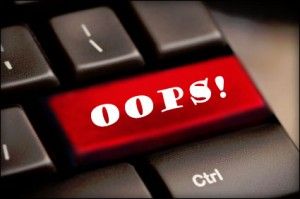Stock markets in Japan received a jolt when a ‘fat finger error’ sparked over $600 billion worth of orders and then cancelled them. An over-the-counter trade for 42 stocks made by an anonymous broker on Wednesday affected a massive volume of shares, including those of blue-chip companies such as Nomura, Honda and Toyota (over-the-counter refers to the trading of OTC shares, which belong to companies not listed on stock exchanges).
Japan’s Securities Dealers Association (JSDA) said in a statement:
“A member company traded 42 issues at the off-exchange transaction at 09:25 on 1 Oct, 2014,” JSDA said in an emailed statement. “This was, however, their error. After all of these reports were cancelled at 09:43, the revised correct report was made at 13:44.”
 Fat Finger Errors are rare.
Fat Finger Errors are rare.
A Fat Finger Error is a human mistake caused by pressing the wrong key when inputting data. They are usually harmless, but can sometimes have devastating and potentially life-threatening consequences. For example, if a mistake is made when placing the decimal point in the dosage instructions for a medication.
In May 2010, there was a rapid and surprising fall in the Dow (the ‘Flash Crash’). Experts believe a trader entered billions rather than millions, i.e. it was a fat finger error. Such trading mistakes are extremely rare today because exchanges and brokerages have implemented safeguards.
Wednesday’s fat finger error in Japan triggered orders worth more than Sweden’s GDP (gross domestic product). Among the 42 issues was one order worth ¥12.68 trillion ($18 billion) for 1.96 billion Toyota shares.
Two years ago, Knight Capital Group almost crashed when it lost over $450 million after computers made erratic orders that could not be undone.
Japan is the world’s second largest trader in stocks and shares, after the United States. Since the turn of the century the amount of trading carried out electronically has grown exponentially.
Much of Japan’s trading occurs over-the-counter (off its exchanges), with buy and sell orders of stocks being submitted and withdrawn all the time.
Japanese regulations stipulate that if there is an error, the broker must file a report within five minutes. Tuesday’s cancellation surprised everybody because of its massive size.
